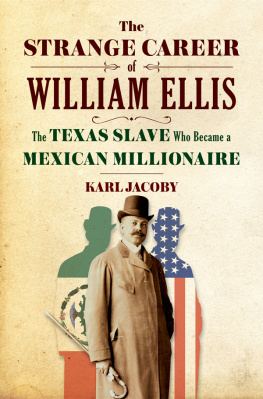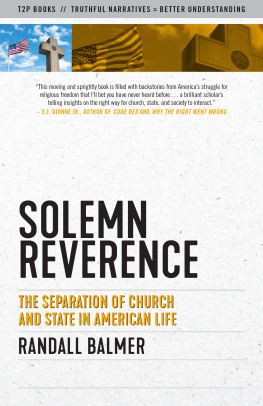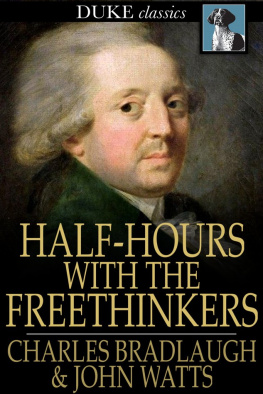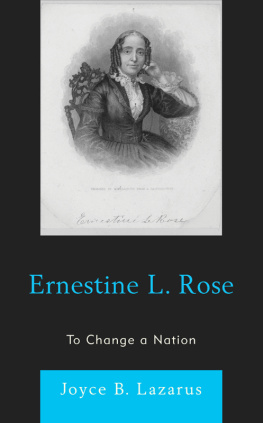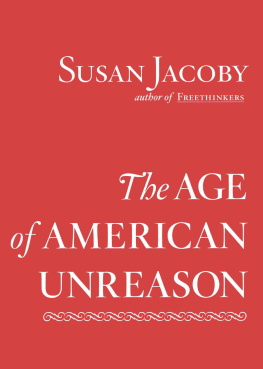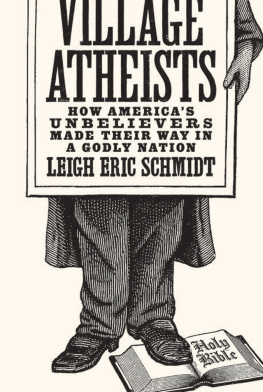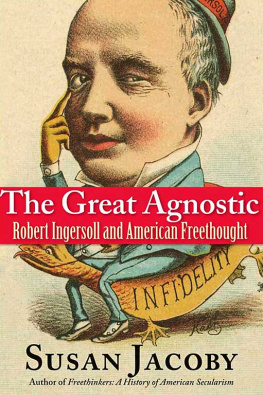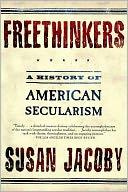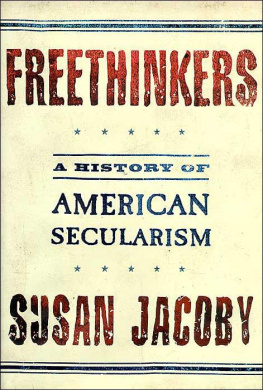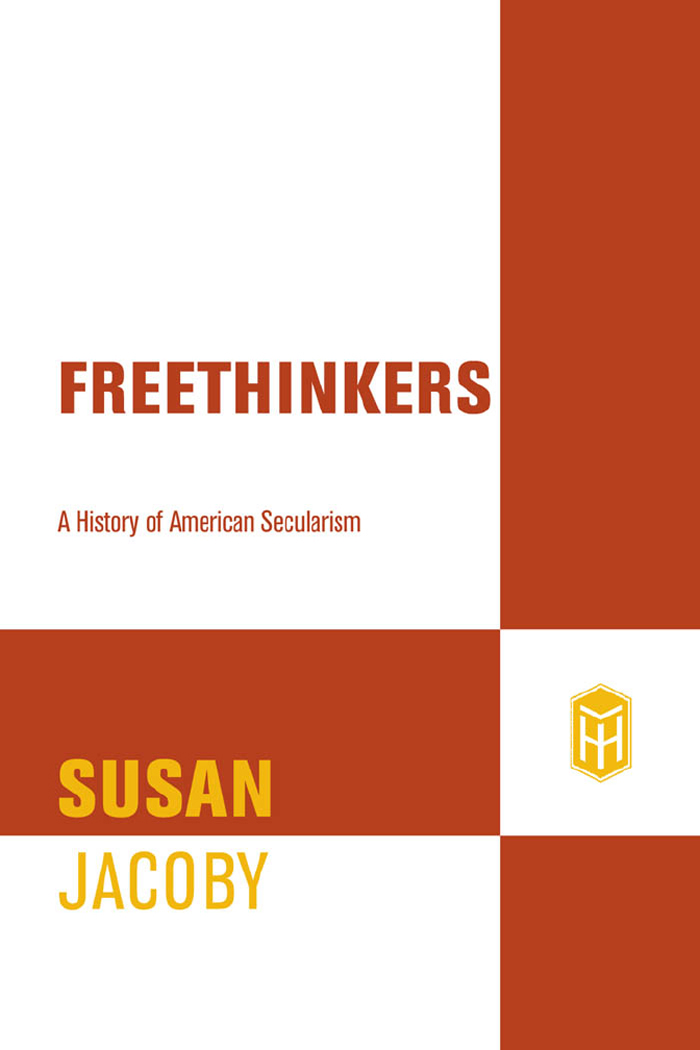FREETHINKERS

ALSO BY SUSAN JACOBY
Half-Jew
Wild Justice
The Possible She
Inside Soviet Schools
Moscow Conversations
FREETHINKERS

A HISTORY OF AMERICAN SECULARISM
SUSAN JACOBY


Metropolitan Books
Henry Holt and Company, LLC
Publishers since 1866
115 West 18th Street
New York, New York 10011
Metropolitan Books is a registered
trademark of Henry Holt and Company, LLC.
Copyright 2004 by Susan Jacoby
All rights reserved.
Distributed in Canada by H. B. Fenn and Company Ltd.
Library of Congress Cataloging-in-Publication Data
Jacoby, Susan, date.
Freethinkers : a history of American secularism / Susan Jacoby.
p. cm.
Includes bibliographical references and index.
ISBN 0-8050-7442-2
1. SecularismUnited StatesHistory. 2. FreethinkersUnited StatesHistory.
I. Title.
BL2760.J33 2004
211.40973dc22 2003059294
Henry Holt books are available for special promotions and
premiums. For details contact: Director, Special Markets.
First Edition 2004
Designed by Fritz Metsch
The image of Thomas Paine is from an engraving in Samuel P. Putman, Four Hundred Years of Freethought (New York: Truth Seeker Company, 1984), and is used, along with the picture of Robert Ingersolls oration, courtesy of the Center for Inquiry/Council for Secular Humanism. The cartoon of Mad Tom and the images of Ernestine L. Rose, Lucretia Mott, and Elizabeth Cady Stanton appear courtesy of the New York Public Library. The image of George E. Macdonald and the frontispiece, The Story of the Truth Seeker, originally appeared in Volume I, Fifty Years of Freethought (1929), published by the Truth Seeker Company. The image of Clarence Darrow originally appeared in Volume II, Fifty Years of Freethought (1931), published by the Truth Seeker Company. The photograph of President George W. Bush in prayer was taken by Eric Draper and is used with permission of the White House.
Printed in the United States of America
10 9 8 7 6 5 4 3 2 1
FOR ROBERT AND IRMA BRODERICK JACOBY
The most formidable weapon against
errors of any kind is reason.
THOMAS PAINE, 1794
Contents
FREETHINKERS

INTRODUCTION
We have retired the gods from politics. We have found that man is the only source of political power, and that the governed should govern.
ROBERT GREEN INGERSOLL,
JULY 4, 1876
On the centennial anniversary of the signing of the Declaration of Independence, Robert Ingersoll, the foremost champion of freethought and the most famous orator in late-nineteenth-century America, paid tribute in his hometown of Peoria, Illinois, to the first secular government that was ever founded in this world. Also known as the Great Agnostic, Ingersoll praised the framers of the Constitution for deliberately omitting any mention of God from the nations founding document and instead acknowledging We the People as the supreme governmental authority. This unprecedented decision, Ingersoll declared, did away forever with the theological idea of government.
The Great Agnostic spoke too soon. It is impossible to imagine such a forthright celebration of Americas secularist heritage today, as the apostles of religious correctness attempt to infuse every public issue, from the quality of education to capital punishment, with their theological values. During the past two decades, cultural and religious conservatives have worked ceaselessly to delegitimize American secularism and relegate its heroes to a kooks corner of American history. In the eighteenth century, Enlightenment secularists of the
Since the terrorist attacks of September 11, 2001, Americas secularist tradition has been further denigrated by unremitting political propaganda equating patriotism with religious faith. Like most other Americans, I responded to the terrorist assaults with an immediate surge of anger and grief so powerful that it left no room for alienation. Walking around my wounded New York, as the smoke from the ruins of the World Trade Center wafted the smell of death throughout the city, I drew consolation from the knowledge that others were feeling what I was feelingsorrow, pain, and rage, coupled with the futile but irrepressible longing to turn back the clock to the hour before bodies rained from a crystalline sky. That soothing sense of unity was severed for me just three days later, when President George W. Bush presided over an ecumenical prayer service in Washingtons National Cathedral. Delivering an address indistinguishable from a sermon, replacing the language of civic virtue with the language of faith, the nations chief executive might as well have been the Reverend Bush. Quoting a man who supposedly said at St. Patricks Cathedral, I pray to God to give us a sign that hes still here, the president went on to assure the public not only that God was still here but that he was personally looking out for America. Gods signs, Bush declared, are not always the ones we look for. We learn in tragedy that his purposes are not always our own.... Neither death nor life, nor angels nor principalities, nor powers, nor things present, nor things to come, nor height, nor depth can separate us from Gods love. May he bless the souls of the departed, may he comfort our own, and may he always guide our country. This adaptation of the famous passage from Pauls Epistle to the Romans left out the evangelists identification of Jesus Christ as Godan omission presumably made in deference to the Jewish and Muslim representatives sharing the pulpit with the president.
Bush would surely have been criticized, and rightly so, had he failed to invite representatives of non-Christian faiths to the ecumenical ceremony in memory of the victims of terrorism. But he felt perfectly free to ignore Americans who adhere to no religious faith, whose outlook is predominantly secular, and who interpret history and tragedy as the work of man rather than God. There was no speaker who represented my views, no one to reject the notion of divine purpose at work in the slaughter of thousands and to proclaim the truth that grief, patriotism, and outrage at injustice run just as deep in the secular as in the religious portion of the American body politic.
Bushs very presence in the pulpit attested powerfully to the erosion of Americas secularist tradition; most of his predecessors would have regarded the choice of a religious sanctuary for a major speech as a gross violation of the respect for separation of church and state constitutionally required of the nations chief executive. Franklin D. Roosevelt did not try to assuage the shock of Pearl Harbor by using an altar as the backdrop for his declaration of war, and Abraham Lincoln, who never belonged to a church, delivered the Gettysburg Address not from a sanctuary but on the field where so many soldiers had given the last full measure of devotion.


